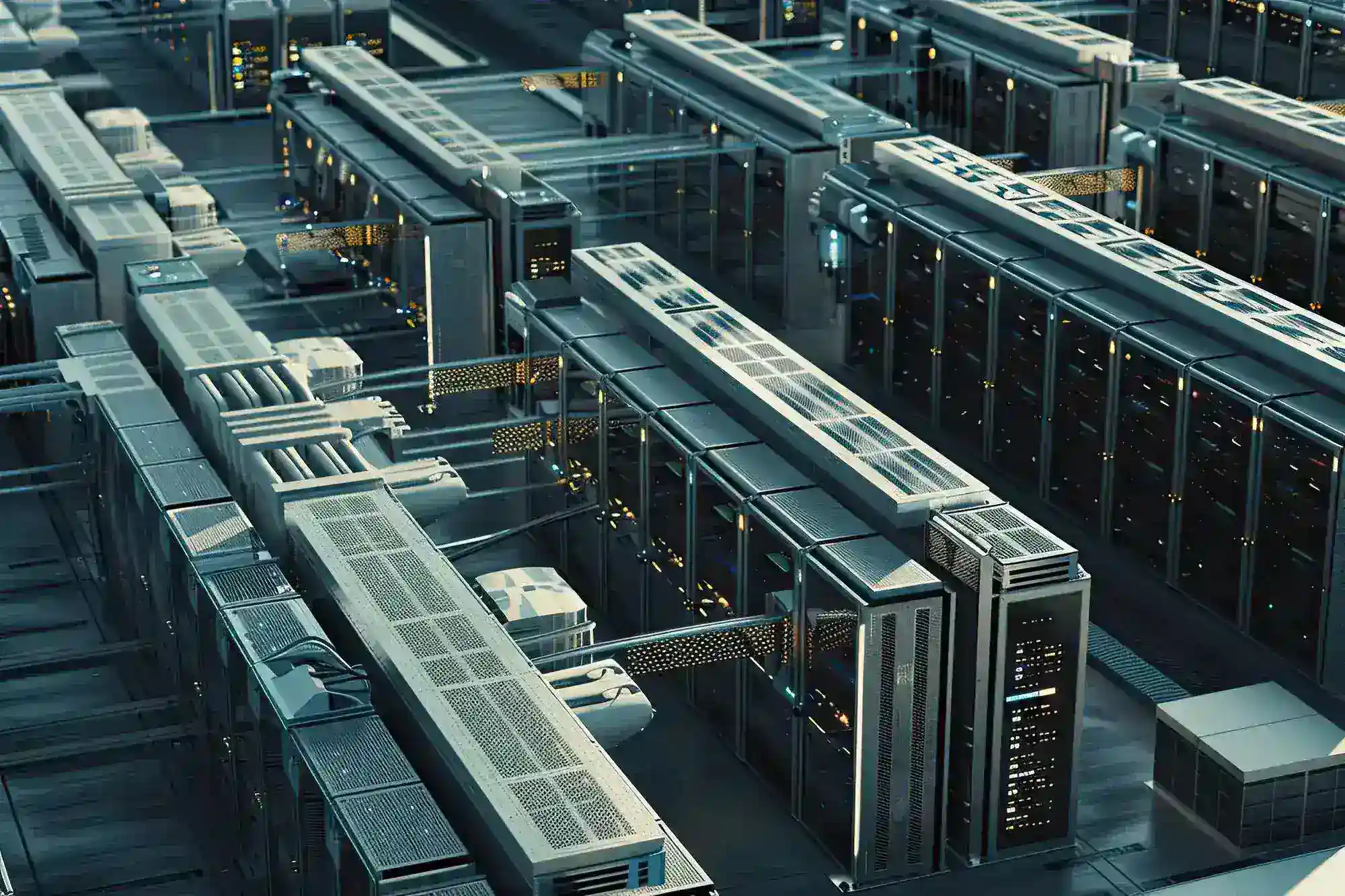In recent years, Meta (formerly Facebook) has made waves in the tech industry with its ambitious projects aimed at revolutionizing the way we interact with the digital world. As AI continues to evolve at a rapid pace, Meta has set its sights on Louisiana as the site for a massive data center. This strategic move is aimed at enhancing its artificial intelligence (AI) capabilities, ensuring that the company remains at the cutting edge of technological advancements.
What Is the Purpose of Meta’s New Data Center?
Meta’s new data center is not just a building with rows of servers; it’s a crucial element in the company’s broader strategy to advance its artificial intelligence (AI) capabilities and improve its global infrastructure. As Meta continues to innovate in AI-driven technologies, this new data center will act as the backbone for processing and storing vast amounts of data that are critical for AI training, research, and development. Essentially, the center will enhance Meta’s ability to handle more complex tasks, faster processing times, and create more powerful AI models to shape the future of its platforms.
In practical terms, this means that Meta will be able to scale its AI systems more efficiently. The company’s current AI projects, including content recommendation engines, chatbots, and AI-driven features across its social media platforms, require enormous amounts of computing power and data. With the new data center, Meta will have the capacity to improve the performance of these systems by providing the necessary infrastructure to handle vast datasets and perform computations at a much faster rate. This will, in turn, improve the accuracy and responsiveness of AI algorithms.
Moreover, this investment in infrastructure aligns with Meta’s long-term vision of becoming a leader in the Metaverse—a fully immersive virtual space that relies heavily on AI. Meta plans to offer more advanced virtual reality (VR) and augmented reality (AR) experiences, which demand significant computing power and low-latency processing. A dedicated data center ensures that AI-driven processes, such as real-time rendering of VR environments and real-time interactions in the Metaverse, can occur seamlessly. It’s a critical step in turning Meta’s virtual reality ambitions into a fully realized, immersive experience.
On a broader scale, Meta’s new data center will improve the company’s ability to innovate not just in AI but also in other areas such as automation, machine learning, and cloud services. With more robust data processing capabilities, Meta will be able to accelerate the development of new AI-powered features and services across its social platforms like Facebook, Instagram, and WhatsApp. This will provide Meta with a competitive edge, enabling the company to stay ahead in the rapidly evolving AI landscape while meeting the growing demand for smarter, more personalized digital experiences.
AI and Data Centers: A Perfect Match
- AI requires large volumes of data to function properly. For AI to learn from past experiences, evolve, and provide accurate predictions, it must have access to vast datasets.
- The efficiency of AI models depends on high-performance computing systems that can process these large datasets quickly and accurately.
- Data centers play a crucial role in this ecosystem by providing the infrastructure necessary to store and process the enormous amounts of data that AI needs.
- They offer powerful computing resources, including advanced servers and storage systems, that are essential for running AI algorithms at scale.
- Meta’s new data center will be specifically designed to meet the demanding needs of AI, providing a secure and high-performance environment.
- By housing AI research and development operations in this data center, Meta can ensure its AI models are trained faster and more efficiently.
- The data center will support Meta’s AI initiatives across multiple platforms, including Facebook, Instagram, WhatsApp, and future Metaverse projects.
- With dedicated resources and powerful infrastructure, the data center will help Meta stay at the forefront of AI innovation, allowing for rapid experimentation and deployment of new AI-driven technologies.
Supporting the Metaverse and Virtual Reality
| Purpose | Meta’s Vision | Requirement | Role of Data Center | AI Integration |
| Powering the Metaverse | Fully immersive virtual world | High-performance computing and storage | Provides scalable infrastructure for large-scale virtual environments | Real-time data processing for AI-driven interactions |
| Enhancing Virtual Reality (VR) | New ways for users to interact in VR | Low-latency processing and rendering | Ensures seamless VR experiences with advanced computational resources | AI assists in adapting virtual environments in real-time |
| Supporting Augmented Reality (AR) | Interaction in the real world with digital overlays | High processing power for AR applications | Supports AR platforms by handling vast data streams and processing them instantly | AI-powered algorithms for object recognition and immersive experiences |
| Scalability of Virtual Worlds | Dynamic and evolving Metaverse environments | Robust and scalable infrastructure | Allows the Metaverse to grow and handle millions of concurrent users | AI models learn and adapt to users’ actions in virtual spaces |
| Real-time Immersion | Innovative ways to socialize and work in virtual spaces | Instant processing of user input | Facilitates smooth, real-time interaction with minimal delays | AI enhances user engagement through personalized interactions |
Meta’s choice of Louisiana as the location for its new data center is strategic for several reasons.
One of the primary reasons for Meta’s decision to establish its new data center in Louisiana is the favorable business environment the state offers. Louisiana has been actively working to attract tech companies through various tax incentives, economic development programs, and a supportive regulatory framework. The state’s government offers financial incentives that can significantly reduce the operational costs for companies like Meta, making it an attractive option for large-scale infrastructure projects. By choosing Louisiana, Meta is able to minimize some of its operational costs while maximizing the potential for growth.
Additionally, Louisiana’s access to renewable energy sources plays a significant role in Meta’s decision-making process. The company has made a strong commitment to sustainability and reducing its carbon footprint, and Louisiana offers a wealth of renewable energy options, such as solar and wind power. With the growing demand for energy to support large data centers, using renewable sources helps Meta align with its environmental goals. This aligns with the company’s global objective of running its data centers on 100% renewable energy, which also helps to improve the public perception of Meta’s commitment to sustainability.
Louisiana’s location offers strategic advantages in terms of access to key markets and connectivity. Situated along the Gulf of Mexico, Louisiana provides Meta with faster and more efficient routes to the rest of the United States and international markets. This geographical positioning makes it easier for Meta to ensure that data can be transferred seamlessly across regions. It also enhances the company’s ability to build global networks and expand its infrastructure to meet the growing demand for AI and cloud services.
Finally, Louisiana’s history of successfully supporting large infrastructure projects and fostering a thriving tech ecosystem makes it an ideal location for Meta’s new data center. The state has seen growth in tech-related industries in recent years, providing a skilled workforce that can support Meta’s technological needs. From engineers to IT professionals, Louisiana offers the talent necessary to operate and maintain the state-of-the-art systems required by a company like Meta. With the establishment of this new facility, Meta is also contributing to the growth of the local tech sector and fostering future innovation.
Favorable Business Environment
- Louisiana provides various tax incentives designed to reduce operational costs for tech companies, making it a cost-effective location for Meta to establish its data center.
- The state offers economic development programs that provide financial assistance to companies willing to invest in infrastructure, further encouraging major tech companies to expand in Louisiana.
- Louisiana has a pro-business regulatory environment, which means fewer bureaucratic hurdles and a more efficient process for setting up large-scale projects like data centers.
- The state’s history of supporting large infrastructure projects ensures that companies like Meta will encounter a stable environment when constructing and operating such high-demand facilities.
- With a strong focus on job creation and economic growth, Louisiana attracts companies looking to establish long-term operations and create local employment opportunities.
- Local and state government partnerships play a crucial role in fostering business growth and making the state an attractive destination for global companies.
- Louisiana’s focus on infrastructure improvements supports the smooth operation of high-tech facilities, such as Meta’s data center, by ensuring reliable utilities and connectivity.
- The state has a skilled workforce, particularly in sectors like engineering and IT, which supports the ongoing needs of tech companies expanding their presence in the region.
Access to Renewable Energy
| Renewable Energy Source | Availability in Louisiana | Impact on Meta’s Sustainability Goals | Role of Data Center Infrastructure | Contribution to Carbon Footprint Reduction |
| Solar Power | Louisiana has high levels of solar radiation, making it ideal for solar energy generation. | Meta can leverage solar power to meet its sustainability targets. | The data center will be equipped with solar panels or connected to local solar farms. | Reduces reliance on non-renewable energy sources, lowering carbon emissions. |
| Wind Power | While not as abundant as solar, Louisiana does have access to wind resources, particularly along the coast. | Wind energy contributes to a diverse renewable energy mix for Meta’s operations. | The data center can integrate wind power with solar to create a more stable energy supply. | Reduces the environmental impact by decreasing the need for fossil fuels. |
| Biomass Energy | Louisiana has abundant agricultural waste and forestry resources, which can be used for biomass energy. | Biomass can complement solar and wind energy for continuous power supply. | Data centers can source power from biomass plants, ensuring a consistent energy flow. | Biomass is a cleaner alternative to traditional energy, further reducing Meta’s carbon footprint. |
| Hydroelectric Power | Louisiana benefits from nearby river systems that could be used to generate hydroelectric power. | Hydroelectric power helps balance energy loads for Meta’s large-scale operations. | Potential for integrating hydroelectric power into the data center’s energy mix. | Low-carbon, renewable energy that supports Meta’s goal of sustainability. |
| Energy Storage and Grid Integration | Louisiana is enhancing its energy grid to accommodate renewable sources and storage technologies. | Energy storage ensures renewable energy is available even when sources are intermittent. | The data center will rely on energy storage systems to maintain energy supply during off-peak hours. | Maximizes the use of renewable energy while minimizing reliance on fossil fuels, aiding in carbon reduction. |
The Economic Impact of Meta’s Data Center
Meta’s new data center in Louisiana is set to have significant economic implications not just for the company, but also for the local and state economies. This multi-billion-dollar investment will create a ripple effect, boosting various sectors and contributing to long-term growth in the region. One of the most immediate impacts will be the creation of jobs. Building and operating such a state-of-the-art facility requires a substantial workforce, ranging from construction workers to engineers, IT professionals, and data scientists. As a result, the data center will generate thousands of direct and indirect jobs in Louisiana, providing a boost to local employment and helping to reduce unemployment rates.
In addition to direct job creation, Meta’s investment will stimulate local economies by increasing demand for goods and services. Contractors and suppliers in the area will see a rise in business, as Meta will need materials, equipment, and services to build and maintain its data center. This will lead to a spike in business activity, supporting small and medium-sized enterprises (SMEs) in the region. Local businesses, such as restaurants, retail shops, and service providers, will also benefit from an influx of employees who will need housing, food, transportation, and other essentials. In turn, these businesses will contribute to local tax revenue, boosting municipal and state budgets.
Moreover, the long-term presence of a global tech company like Meta in Louisiana will attract further investment into the region. The data center is likely to become a hub for tech innovation, encouraging other technology firms and startups to set up operations nearby. This can lead to the creation of a thriving tech ecosystem, where companies, universities, and research institutions collaborate on new technologies and innovations. Louisiana’s reputation as a growing tech hub will likely attract additional investments in sectors such as artificial intelligence, renewable energy, and cloud computing, fostering a diversified and resilient local economy.




